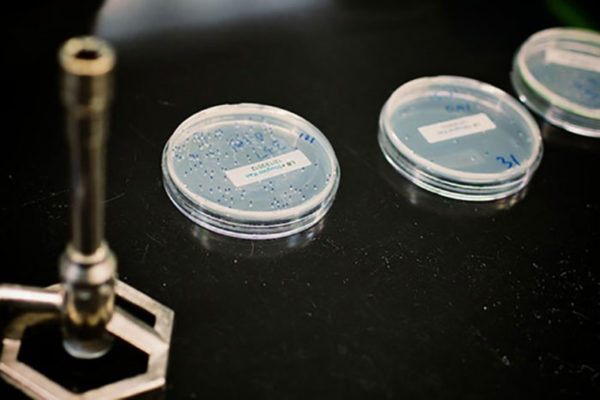Women’s Society presents Switzer awards, Danforth scholarships
The Women’s Society of Washington University announced the winners of the Harriet K. Switzer Leadership Award and the Elizabeth Gray Danforth Scholarship during its annual membership meeting recently.
Sculpture takes flight
Over the last four months, students in the Graduate School of Architecture & Urban Design at Washington University in St. Louis have digitally designed, modeled and constructed prototypes for a 100-foot-long public sculpture. Now, over the next several weeks, the students will fabricate and install the finished piece, titled “Spectroplexus,” at St. Louis Lambert International Airport.
Bolden named director of parking and transportation
Gwendolyn Bolden has been appointed director of Parking & Transportation at Washington University, announced Dedric Carter, vice chancellor for operations and technology management. Bolden is a certified administrator of public parking and has worked at universities and municipalities across the nation.
Washington University announces 2017-18 Great Artists Series
Katia and Marielle Labèque are “the best piano duet in front of an audience today” (The New York Times). Susan Graham is “America’s favorite mezzo” (Gramaphone Magazine). The Calidore String Quartet boasts “understated but relentless intensity” (Los Angeles Times). For its 2017-18 Great Artist Series, Washington University in St. Louis will present three affordably priced concerts by some of today’s finest performers.
Antibiotic resistance circumvented in lab
As dangerous bacteria grow more savvy at evading antibiotics, researchers are seeking new ways to counterattack. Rather than design new drugs from scratch, some scientists are searching for ways to block the microbes’ evasive maneuvers. If resistance can be shut down, current drugs should remain effective. That concept is demonstrated in a new study from the School of Medicine.
Uninsured breast cancer patients more likely to die
Uninsured women with breast cancer were nearly 2.6 times more likely to have a late stage diagnosis than cancer patients who were insured, finds a new study from Kimberly Johnson, associate professor at the Brown School.
Hundreds celebrate Eliot Society milestone
Eliot Society members gathered at their annual gala recently to celebrate 50 years of contributing time, talent and treasure to Washington University in St. Louis. This year’s recipient of the Search Award was John Biggs, an eminent economist, philanthropist and longtime trustee who has been instrumental in helping advance the institutional mission through a variety of roles and across several decades.
Guo named Yangtze River Scholar
Shenyang Guo, the Frank J. Bruno Distinguished Professor of Social Work Research at the Brown School and assistant vice chancellor for international affairs – Greater China, has been named a Yangtze River Scholar by the Ministry of Education of the People’s Republic of China.
Trustees meet, elect new board members and officers
At its spring meeting, held Friday, May 5, the Board of Trustees at Washington University in St. Louis elected five new members, re-elected four members and elected officers, among other actions, according to Chancellor Mark S. Wrighton.
Many Washington University medical students seek dual degrees
Nearly one-third of the 135 students graduating this month from the School of Medicine will receive more than one degree. Those 44 students also will have earned advanced degrees in fields such as public health, biology and business. The drive for dual degrees reflects burgeoning motivation among physicians-to-be, particularly those attending the nation’s top-tier medical schools.
View More Stories









